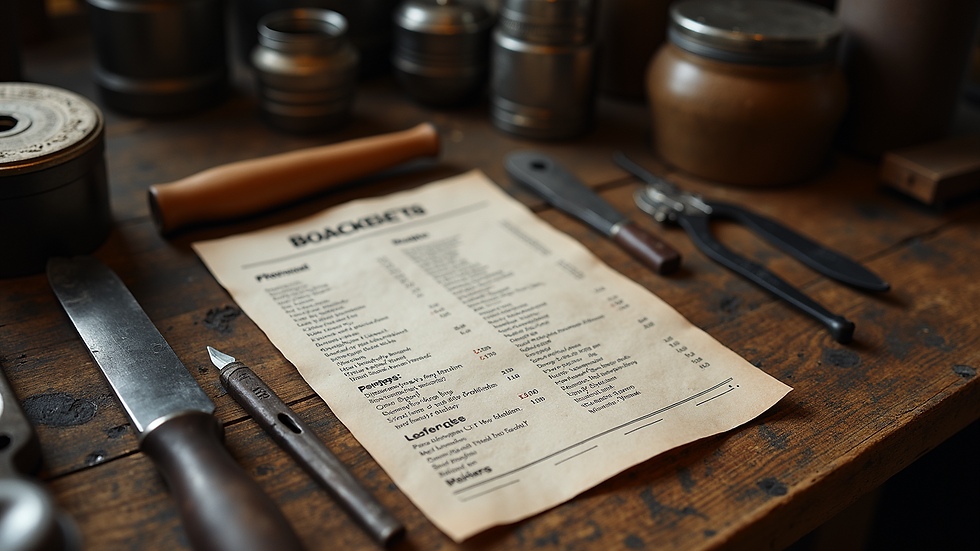Mastering Hands-On Forging Techniques in Local Workshops
- Mike Bailey
- Sep 30
- 4 min read
Blacksmithing is an ancient craft that has stood the test of time. It combines skill, strength, and creativity. I’ve found that nothing beats learning this craft hands-on. Local workshops offer the perfect setting to dive into forging. They provide tools, guidance, and a community of like-minded enthusiasts. If you want to master blacksmithing, these workshops are the place to start.
Discovering Hands-On Forging Workshops
Hands-on forging workshops are designed to teach you the basics and beyond. You get to work directly with metal, heat, and hammer. The experience is immersive and practical. You learn by doing, which helps you retain skills better than just reading or watching videos.
In these workshops, instructors guide you through each step. You start with simple projects like making hooks or small tools. As you progress, you tackle more complex items. The workshops often include:
Safety training
Tool handling
Heating and shaping metal
Finishing techniques
The best part is the immediate feedback. You can ask questions and get tips on improving your technique. Plus, you leave with a piece you made yourself. It’s a rewarding feeling.

Essential Tools and Techniques You Will Learn
When you join a hands-on forging workshop, you get introduced to essential blacksmithing tools. These include:
Anvils
Hammers
Tongs
Forge (the furnace for heating metal)
Quenching tanks
You learn how to use each tool safely and effectively. For example, hammering requires rhythm and control. You don’t just hit the metal hard; you shape it with precision.
The forge is the heart of the workshop. You’ll learn how to heat metal to the right temperature. Too hot, and it melts; too cold, and it won’t shape. The instructor will show you how to recognize the color changes in the metal as it heats.
Techniques covered include:
Drawing out - lengthening the metal
Upsetting - thickening the metal
Bending - shaping curves and angles
Twisting - creating decorative patterns
Each technique builds your confidence and skill. You’ll practice on scrap metal before moving to your project.

How Much Does a Blacksmith Charge?
Understanding the cost of blacksmith services helps you appreciate the value of learning the craft yourself. Blacksmiths charge based on the complexity of the work, materials, and time involved. Typical charges range from $50 to $150 per hour for custom work.
Simple repairs or small items might cost less, while intricate designs or large projects cost more. Some blacksmiths also charge a flat fee for specific items like gates, railings, or knives.
When you attend a hands-on forging workshop, you pay a fee that covers instruction, materials, and use of tools. This fee is often much less than commissioning a custom piece. Plus, you gain skills that let you create your own projects in the future.
If you want to find a blacksmith near me, check local listings or visit community centers. Many offer workshops at reasonable prices.

Tips for Getting the Most from Your Forging Workshop
To make the most of your hands-on forging workshop, keep these tips in mind:
Wear appropriate clothing: Long sleeves, closed-toe shoes, and natural fibers protect you from sparks and heat.
Arrive early: This gives you time to get familiar with the space and tools.
Ask questions: Don’t hesitate to seek clarification or advice.
Practice patience: Forging takes time to master. Mistakes are part of learning.
Take notes: Jot down techniques and tips for future reference.
Stay hydrated: Working near a hot forge can be dehydrating.
Respect safety rules: Always follow instructor guidelines to avoid accidents.
By following these tips, you’ll have a safer and more productive experience. You’ll also build a solid foundation for your blacksmithing journey.
Why Local Workshops Are the Best Choice
Local workshops offer unique advantages over online tutorials or books. They provide a hands-on environment where you can touch, feel, and manipulate metal. The social aspect is also important. You meet other enthusiasts who share your passion. This community can inspire and motivate you.
Workshops often use traditional methods and tools. This connection to history adds depth to your learning. You also get to see the craftsmanship up close, which is hard to replicate online.
Supporting local workshops helps preserve this ancient craft. It keeps the tradition alive and accessible to new generations. If you want to experience authentic blacksmithing, look for a blacksmith near me that offers hands-on forging workshops.
Taking Your Skills Beyond the Workshop
After completing a workshop, you might want to continue practicing. Here are some ways to keep improving:
Set up a small forge at home if space and budget allow.
Join local blacksmithing clubs or groups.
Attend advanced workshops or specialty classes.
Experiment with different metals and projects.
Share your work online or at craft fairs.
Remember, blacksmithing is a lifelong craft. Each project teaches you something new. The more you practice, the better you become.
Hands-on forging workshops are a fantastic way to dive into blacksmithing. They offer practical skills, expert guidance, and a supportive community. Whether you want to make tools, art, or just try something new, these workshops open the door to a rewarding craft. If you’re ready to start, find a blacksmith near me and take the first step today.



Comments